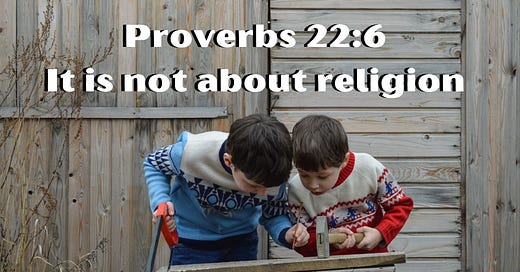Understanding Proverbs 22:6
It is not about religion
One of the most quoted scriptures from the Book of Proverbs is: "Train up a child in the way he should go: and when he is old, he will not depart from it" (Proverbs 22:6). This wisdom, ancient yet timeless, offers profound guidance for nurturing children. However, the depth of this proverb extends far beyond a simple admonition; it encompasses a holistic view of understanding and fostering a child's inherent strengths.
Contextual Insights
Many assume that religious upbringing is the focus of training. However, in the context of Proverbs, the child’s religion is a foregone conclusion. The writer of Proverbs is not admonishing Hebrew parents to rear their children strictly as practitioners of the Law of Moses. Rather, the admonition appears to focus more on nurturing a child in their strengths. It encourages parents to accentuate the child's strengths and set them on a path to success that aligns more closely with their natural talents and inclinations.
Interpreting the Verse with Modern Analogies
Consider the scenario where a child excels in tennis but struggles with mathematics. Conventional wisdom might suggest hiring a tutor to improve their academic performance. However, the proverb encourages us to focus on enhancing the child's natural capabilities—investing in a tennis coach rather than a math tutor in this analogy. This approach not only plays to the child's strengths but also builds their confidence and expertise in areas where they are naturally inclined to succeed.
Practical Application in Parenting
The essence of Proverbs 22:6 is not necessarily about religious or academic training but understanding the child’s individuality and natural bend. True training, as suggested by the proverb, involves:
Observation: Parents need to be keen observers, identifying and understanding the unique traits and talents of their children.
Nurturance: Once these talents are identified, it is crucial to nurture and cultivate them, providing opportunities for children to excel in their natural inclinations.
Support: Supporting a child’s natural abilities requires commitment—ensuring the child has access to the right resources, whether that means classes, coaching, or simply time to practice and hone their skills.
The Role of Encouragement
Beyond the tangible support, encouragement plays a pivotal role. Children thrive when their efforts are recognized and celebrated. It reinforces their interest and commitment to the areas where they naturally excel. This support system is critical in fostering a positive attitude and a strong sense of self, which are invaluable as they grow.
Conclusion
"Train up a child in the way he should go" is not a directive to mold children into predefined shapes but to guide them along paths where they are most likely to find success and fulfillment. This approach ensures that when they are old, they not only do not depart from these ways but live them out fully and joyfully. As parents, caregivers, and mentors, the call is to commit deeply to this personalized journey of upbringing, recognizing and nurturing the inherent potential within each child, allowing them to grow into their best selves.
Editorial Note:
Before anyone jumps to conclusions, it's important to note that Scripture does more than admonish—it commands—that we rear our children to be Christians under the New Covenant. The directive to raise our children as Christians is clearly outlined in other passages. However, the context of Proverbs 22:6 is not focused on religion.



